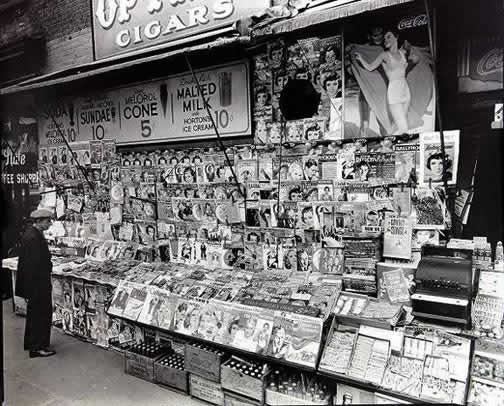You have to be able to pick up opportunities that come along. Sometimes you need to say “We’re going in a new direction because that’s what makes sense today”
Rework
 The other night I went to a panel discussion billed as the Future of the Bookstore and I have been trying to collect my thoughts about it ever since but not sure I have yet. Predicting the future is a tough business and maybe not a fruitful one unless you’re Ray Kurzweil or an investment banker.
The other night I went to a panel discussion billed as the Future of the Bookstore and I have been trying to collect my thoughts about it ever since but not sure I have yet. Predicting the future is a tough business and maybe not a fruitful one unless you’re Ray Kurzweil or an investment banker.
I wasn’t expecting that booksellers would be traveling around in jetpacks or that robots would do all the unpacking but geez at least one mention of RFID would have been interesting, or the idea of cross marketing and narrowcasting not so sneered upon. This was a problem for me. I have an independent booksellers heart. I worked behind the curtain of independent bookselling for pretty well all of my youthful years and I know that that velvet curtain can sometimes blow in your face and blind you.
It seemed to me that the panel focused a lot on an anachronistic and mostly romantic view of what a bookstore is or was and in that sense I think most of us in the audience were happy to go along with this song and dance. After all we were all in the choir. But in the back of my head as the evening progressed I realized that there was something really missing from this panel on the future of the bookstore and that was a future where the bookstore was anything different than it is right now.
There was some hand wringing over how to sell ebooks and there was some 30,000 foot view at the opening two minutes but nothing really emerged that made you think yes, that is the answer. And again to be fair maybe there isn’t an answer?
But, the panel was not made up of the booksellers that are actually making the most difference, other than perhaps one. But a caveat that even though I love the McMaster entrepreneurial spirit, not all bookstores can be on university campuses and the majority of shoppers are not going to go hunting on campuses around the community to find these bookstores. The future needs to take place on the street, in small businesses where resources are tight and budgets are even tighter.
Openness:
A key ingredient to success in the future will be openness and sharing information. To that point there was a very big hole on the future of the bookstore panel with the absence of any etailer or chain bookseller. In fact these places got slammed by this panel but in reality isn’t that landscape the place where the future is being played out? How many times will Indigo get lambasted for selling so much stuff alongside books before booksellers say oh yeah that’s a good idea maybe I can do a better job of selling art, or some toy tie-ins or dvds -maybe even yoga mats! Everyone knows Walmart and Loblaws and any number of mass merch stores sell books because people who buy books buy more stuff from that store, spend more time in the store and spend more money in the store. Why wouldn’t I do this as a bookseller?

Hyperlocal:
Yes the bookstores in our neighbourhood have been the hub of cultural activity, in the same way newsstands used to be the hub of street philosophers. A good bookseller used to be able to tell you what books to read if you were pursuing an interest or hobby, but even a good bookseller doesn’t know everything and inevitably says something like “well this looks like maybe it might address grieving when your 10 year old’s pet cat passes away” but it is just a guess. The place that can really answer that question is a little universe called the internet.
Look to the libraries:
Librarians used to be staunch disciplinarians who sat and whispered shush to the reading public. Now they are information workers who basically get IT educations. This is what bookstores need. They need to higher and retain people who can find their way around a network, know about encoding and can build you a web page or facebook group or market your wares on the social networks as well as carry a passion for books.
Maybe this is happening but if not, please give your employees some free reign and let them work the magic. You need to invest in your employees not just treat them like indentured servants! Especially if you want to keep them around. Maybe subsidize some professional development, let them become the social network and software experts in the industry and stop the brain drain. You worry too much about losing employee knowledge but you’re not giving them anything to make them stay. Encourage them to attend bookcamps, encourage them to run bookcamps, get out front of the machine before the machine chews you up and spits you out.
Research and Investment:
Get some market intelligence. Get lots of it. Get it now! Don’t believe the pundits. Do your own research. Embrace metadata (oh yeah -don’t dis metadata when BNC is in the room….) Go to industry conferences. Help make digital catalogues that work. (I am done now promoting BookNet services). The changes that are happening are a mixture of social and technological in nature. Booksellers have traditionally been good at the social and terrible at the technological. Transmedia means software, games, movies, books; social media means global communities of experts willing to give away knowledge. Bookstores need to know how to move faster to leverge things like crowdsourcing and they need to be the ones who figure out how it affects the street, the people that they meet each day.

Back in Time:
But in reality we all know what happens when you work in a bookstore. You run all day! Margins are slim. You need to find distributors, unpack books, take special orders, shelve books, dust shelves, rearrange sections, return books that are damaged, that are stale, vacuum, talk to your customers. The romance dies a quick and nasty death in the face of the daily in-the-trenches bookstore. Future proofing your business may mean being hyper attuned to what is happening everyday and being open enough to say ok, lets make that happen.
You are small and agile compared to the big chains that need to make committee decisions to change the location of a category. Take advantage of that. Don’t be afraid of the big guys, you can learn more from what works and doesn’t work in those venues than you care to admit.


